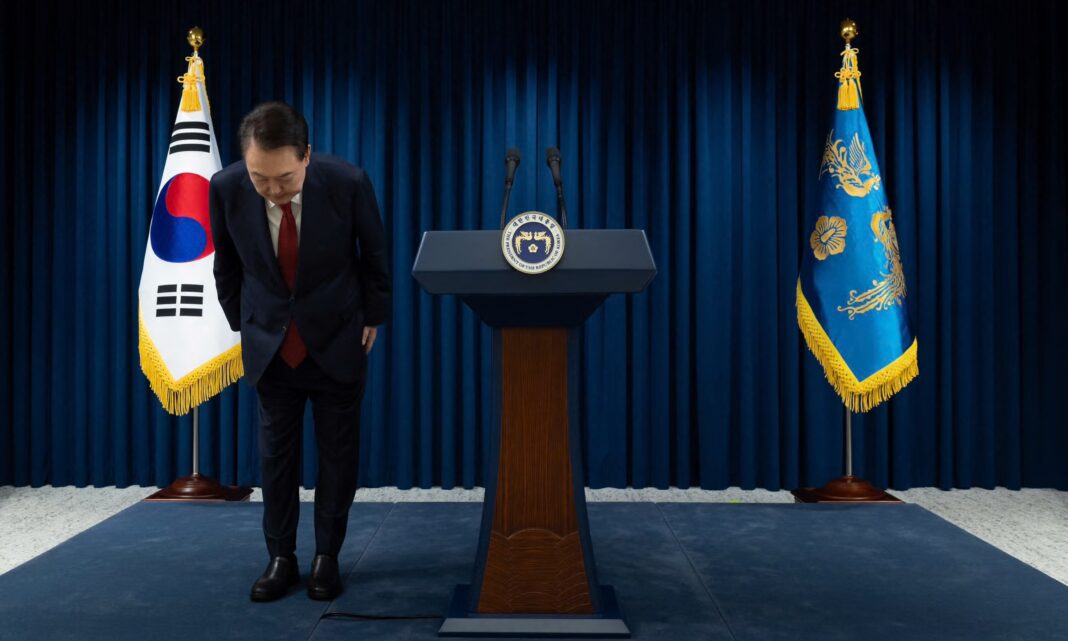South Korea faces its worst political crisis in decades after President Yoon Suk Yeol briefly declared martial law. The dramatic move triggered impeachment, widespread protests, condemnation from opposition parties, and international concern. This article unpacks the events, reactions, and potential implications of this unprecedented political turmoil.
Martial Law Declaration Shocks Nation
On Tuesday night, President Yoon declared martial law, citing threats from North Korea and domestic “anti-state forces.” Martial law is an extreme measure, allowing the military to take control of civilian functions, including policing and governance. This was South Korea’s first martial law declaration in over 40 years.
The announcement stunned the nation, sparking protests in major cities. Thousands gathered outside the National Assembly in Seoul, waving flags and demanding Yoon’s resignation. The move also drew sharp criticism from opposition lawmakers, who accused Yoon of violating the constitution to suppress investigations into his alleged misconduct.
Opposition Pushes for Impeachment
The opposition, led by the Democratic Party, holds a majority in the 300-seat parliament. They submitted a motion to impeach Yoon, alleging severe constitutional violations. To pass the motion, the opposition needs support from some members of Yoon’s ruling People Power Party.
The impeachment process requires approval from two-thirds of the National Assembly. If passed, it must then be upheld by South Korea’s Constitutional Court. This would mark only the second presidential impeachment in the country’s democratic history.
Defence Minister Resigns Amid Crisis
Amid the chaos, Defence Minister Kim Yong-hyun resigned. His departure added another layer to the crisis, as he too faced an impeachment motion from opposition lawmakers. If Yoon accepts the resignation before a parliamentary vote, Kim would avoid impeachment.
—
Yoon’s U-Turn Eases Tensions
In the early hours of Wednesday, Yoon rescinded the martial law order after parliament voted against it. The sudden reversal brought relief to protesters, who had braved freezing temperatures overnight. Demonstrators celebrated outside the National Assembly, chanting slogans and waving banners.
Despite the withdrawal, the political damage was done. Yoon’s approval rating, already at a historic low of 19%, plummeted further. Critics across the political spectrum labeled his actions as reckless and undemocratic.
International Community Reacts
The international response was swift. The United States, which stations nearly 30,000 troops in South Korea, expressed concern over the declaration. The crisis prompted Washington to postpone key military consultations with Seoul.
Japan and China also reacted. Japan canceled a planned visit by a parliamentary delegation, while China advised its citizens in South Korea to remain cautious. The global community viewed Yoon’s actions as destabilizing, especially in a region already fraught with tension over North Korea’s nuclear program.
Protests Continue Nationwide
Public outrage has not subsided despite the lifting of martial law. Labor unions announced a general strike, demanding Yoon’s resignation. Civic groups held candlelight vigils reminiscent of those that led to the impeachment of former President Park Geun-hye in 2017.
On the streets of Seoul, citizens expressed frustration and confusion. Many viewed Yoon’s move as an overreach of power, while others criticized the government’s focus on political survival instead of addressing pressing economic issues.
Political Future in Jeopardy
The crisis has cast doubt on Yoon’s ability to govern. His administration is already grappling with economic challenges, including inflation and unemployment. The declaration of martial law has further eroded public trust.
If impeached, Yoon could face legal consequences and lose political immunity. The Democratic Party has called his actions an “insurrection” and vowed to hold him accountable.
Historical Parallels
South Korea’s modern history includes periods of military rule and martial law. However, such measures are rare in its democratic era. Yoon’s declaration has drawn comparisons to the country’s authoritarian past, raising fears of a regression in democratic norms.
The last president to face impeachment was Park Geun-hye, who was removed from office in 2017 following massive protests. Ironically, Yoon played a key role in her prosecution as a former public prosecutor.
South Korea now stands at a crossroads. The political turmoil sparked by Yoon’s martial law declaration has shaken its democratic foundations. The coming days will determine whether he remains in office or joins the ranks of impeached leaders. As protests continue and the impeachment process unfolds, the nation watches anxiously, hoping for a resolution that upholds its hard-earned democracy.

